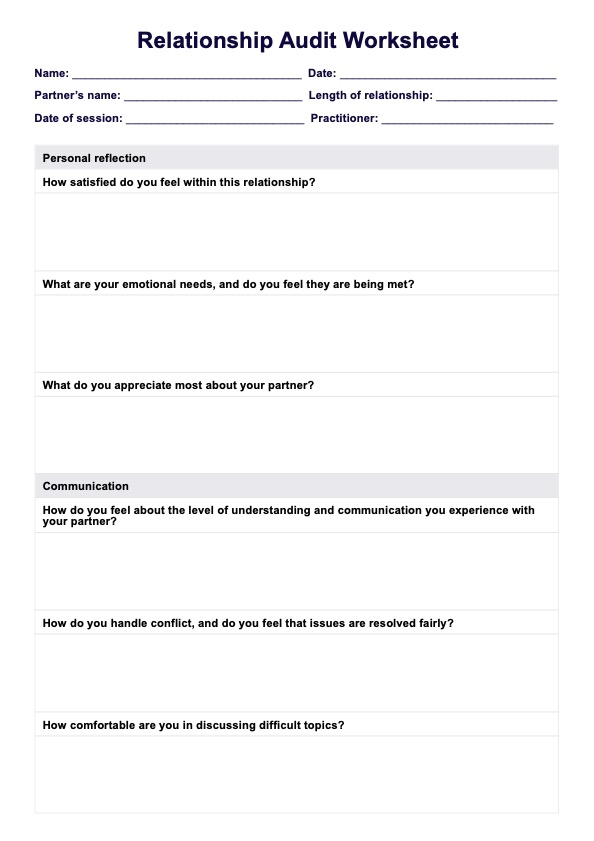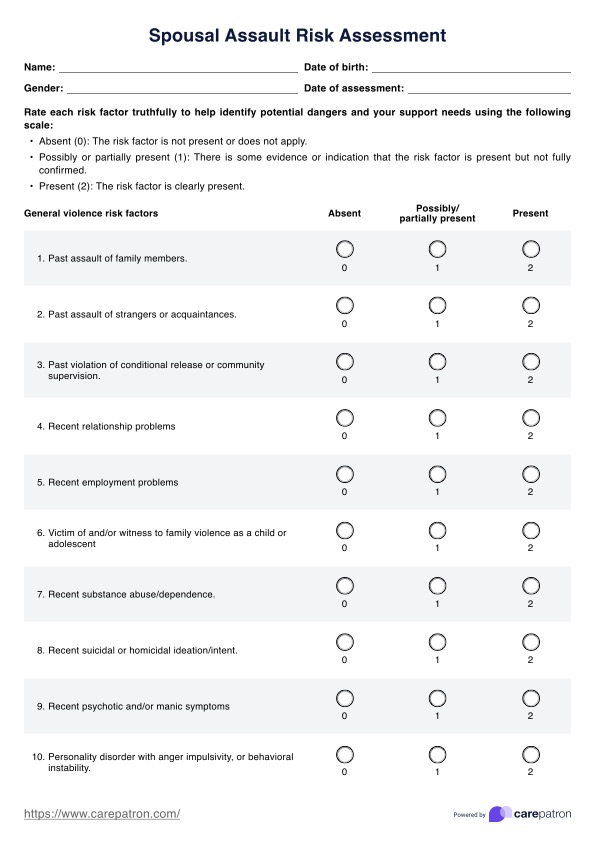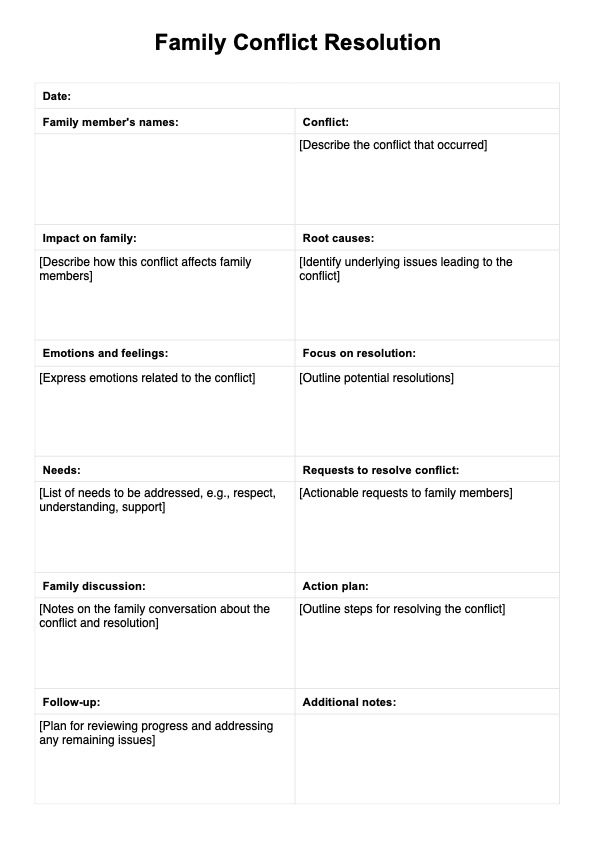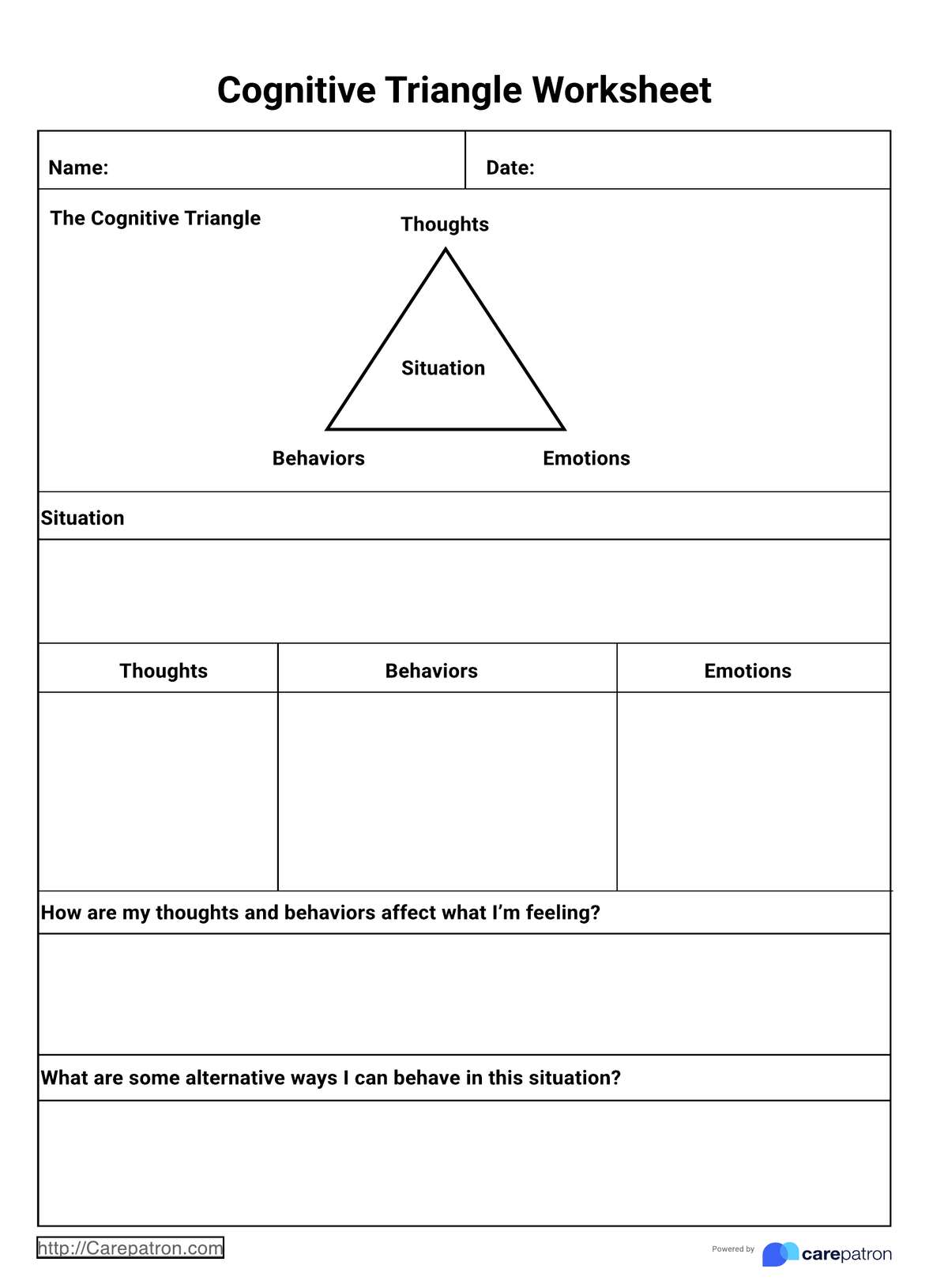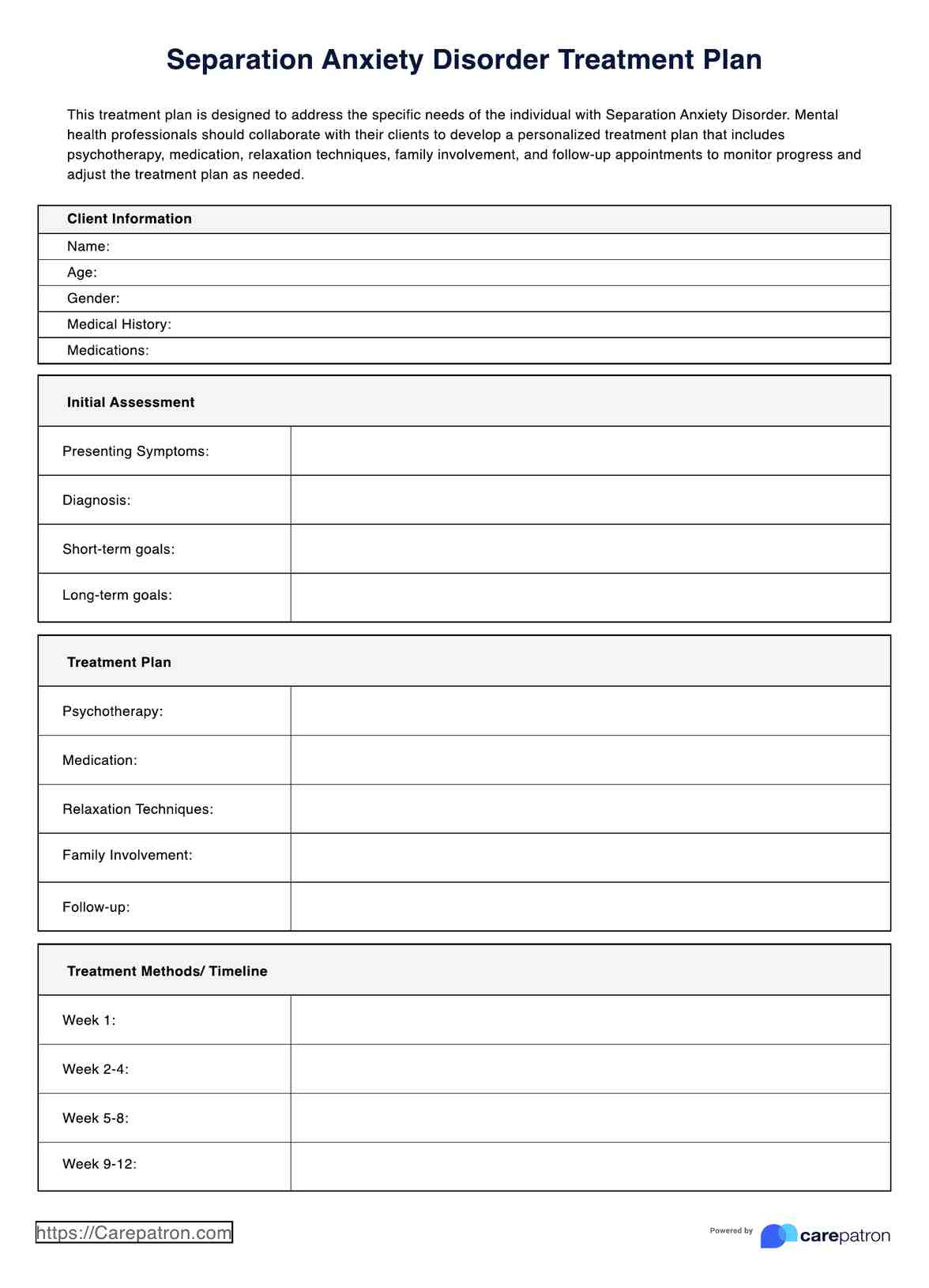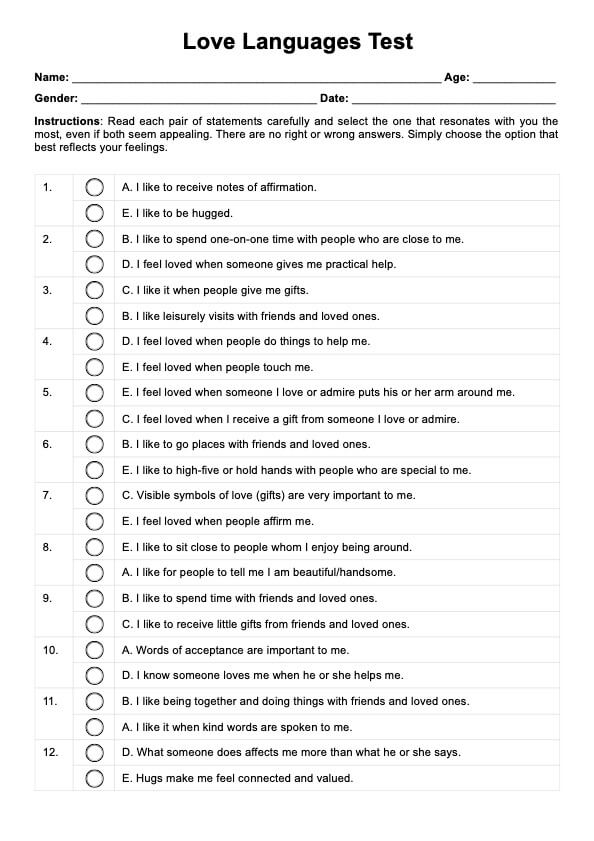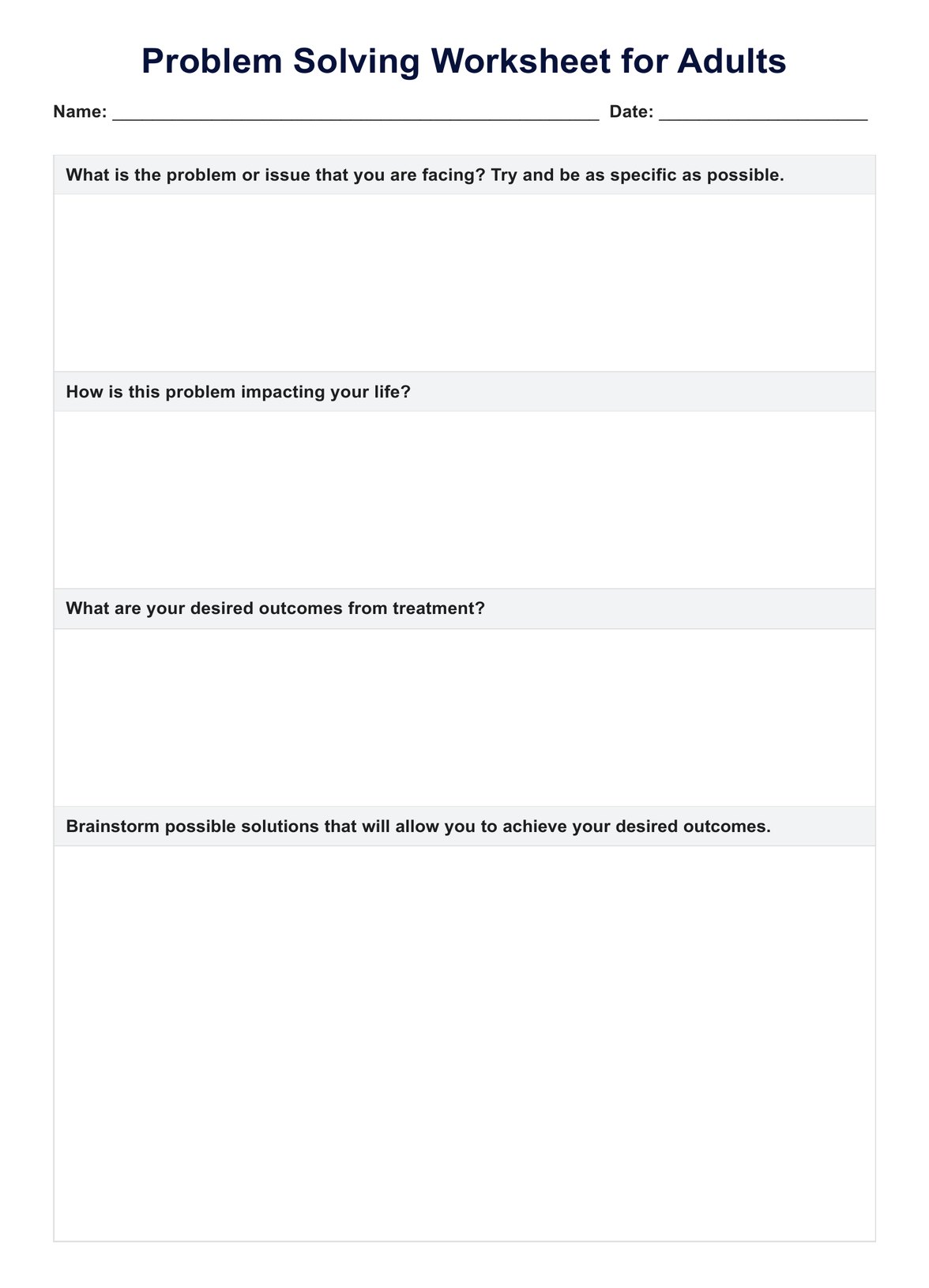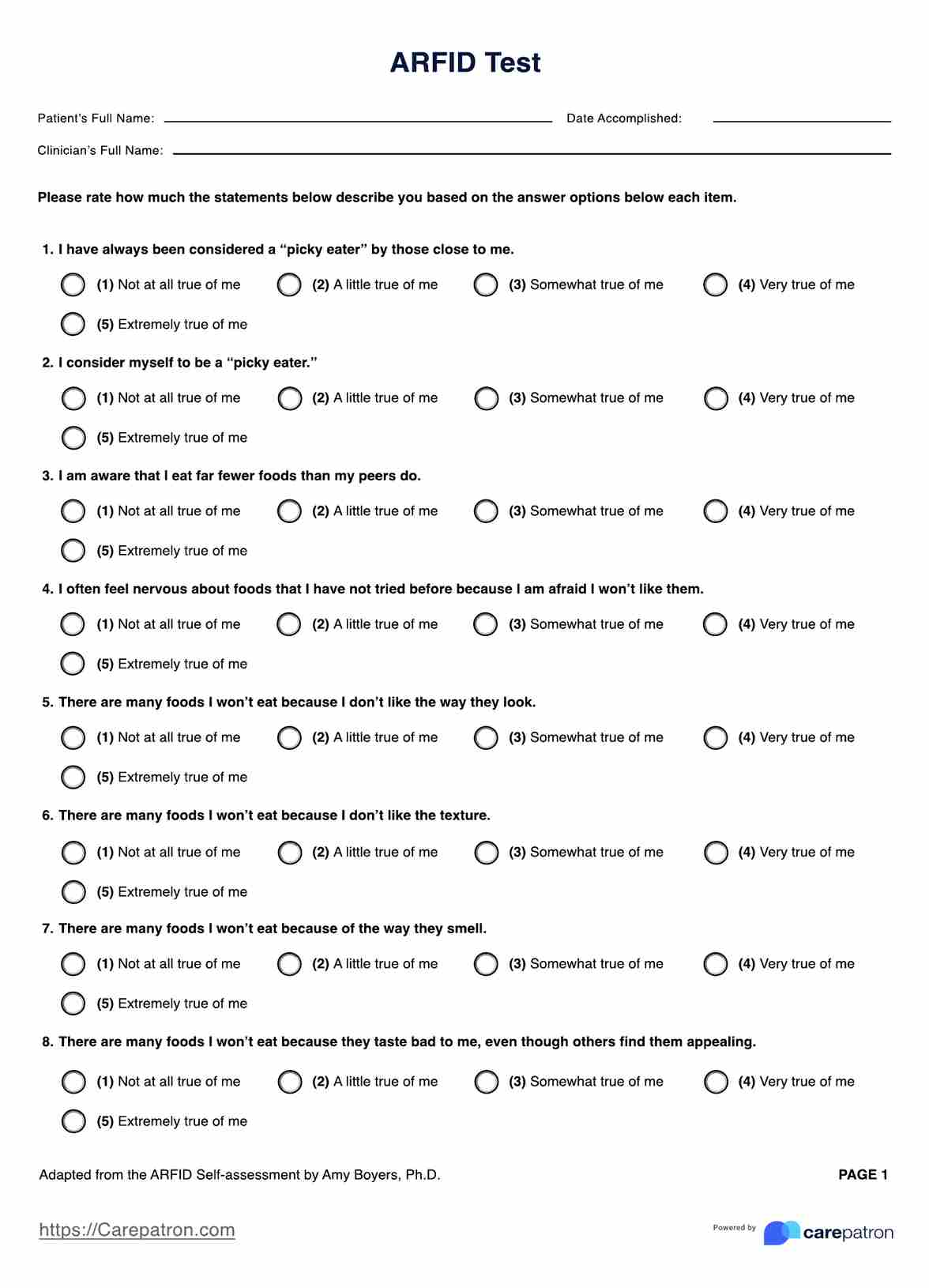Repairing Relationships During Recovery CBT Worksheet
Rebuild trust and connection with our CBT worksheet for repairing relationships during recovery in healthcare.


What is Cognitive Behavioral Therapy?
The interaction between thoughts, feelings, and behaviors is the main focus of CBT, a widely used and incredibly effective type of psychotherapy. It is based on the knowledge that our ideas and perspectives about events directly impact how we experience emotions and respond to situations. The goal of CBT, which is structured and goal-oriented, is to assist people in recognizing and changing the negative thought patterns and behaviors that cause emotional distress and impair functioning.
In the context of repairing relationships, CBT can be an invaluable tool. Our perceptions, interpretations, and reactions to the behaviors and words of others profoundly influence relationships. Often, individuals may have distorted beliefs or negative thought patterns about themselves, their partners, or their relationships, contributing to conflicts, resentment, and emotional distance.
CBT assists individuals in recognizing these dysfunctional thought patterns, known as cognitive distortions, and replacing them with more realistic and balanced perspectives. For instance, someone struggling with trust issues might have a cognitive distortion that makes them believe their partner is always untrustworthy. CBT teaches them to challenge and reframe these thoughts, considering alternative explanations and evidence that support a more accurate and constructive view of the relationship.
Additionally, CBT equips individuals with effective coping strategies and communication skills. They learn to express their needs and concerns assertively and respectfully, improving their ability to navigate conflicts and misunderstandings within the relationship. This enhanced communication fosters empathy, understanding, and a stronger emotional connection between partners.
CBT is often structured in a collaborative, time-limited format, allowing individuals to work with a trained therapist to develop tailored strategies for repairing and improving relationships. Through self-reflection, challenging maladaptive thought patterns, and implementing new coping mechanisms, individuals undergoing CBT can experience significant positive shifts in their relationships, promoting healing and growth within recovery.
Repairing Relationships During Recovery CBT Worksheet Template
Repairing Relationships During Recovery CBT Worksheet Example
How To Use the Repairing Relationships During Recovery CBT Worksheet
The "Repairing Relationships During Recovery CBT Worksheet" is a valuable tool designed to assist individuals in mending and strengthening their relationships as part of their journey towards recovery, utilizing the principles of Cognitive Behavioral Therapy (CBT). This worksheet is a structured guide to help clients identify, assess, and address issues within their relationships, fostering healthier dynamics and improved emotional well-being.
Steps to Use the Worksheet:
1. Relationship Assessment:
Begin by describing the relationship you aim to repair or enhance. Specify the relationship type, duration, and the key issues or challenges you face. This initial step provides a clear focus for your efforts.
2. Emotional Responses:
Identify and list the emotions you often experience within the specified relationship. This step helps you become more aware of your emotional reactions, which are critical in CBT for understanding the connection between thoughts, emotions, and behaviors.
3. Examine Your Thoughts:
Explore and document your negative or distorted thoughts related to the relationship. These thoughts can shape your feelings and actions. For example, believing your partner does not care can lead to sadness or frustration.
4. Cognitive Distortions:
Reflect on the negative thoughts identified in the previous step and recognize any cognitive distortions present. These could include all-or-nothing thinking, mind-reading, or jumping to conclusions. Challenge these distortions with more balanced and realistic thoughts.
5. Communication and Conflict:
Describe your recent communication patterns and identify any conflicts or misunderstandings. Understanding how you interact and the triggers for conflicts is crucial in improving relationship dynamics.
6. Coping Strategies:
List healthy coping strategies to manage your emotions and handle conflicts more effectively. These strategies help you constructively respond to emotional triggers.
7. Action Plan:
Set specific, achievable goals for improving the relationship. These goals will guide your efforts in implementing the coping strategies and addressing cognitive distortions identified earlier.
8. Schedule a Follow-Up:
Determine when you will revisit your progress on the established goals. This ensures accountability and allows you to assess the effectiveness of your efforts.
By following these steps and regularly revisiting the worksheet, individuals can work collaboratively with their healthcare practitioners to implement CBT techniques tailored to their unique relationship challenges. This structured approach empowers clients to take proactive steps toward repairing and enhancing their relationships during recovery, ultimately promoting emotional healing and growth.
When Would You Use This Repairing Relationships During Recovery CBT Worksheet?
The "Repairing Relationships During Recovery CBT Worksheet" is a versatile tool that can be employed in various healthcare settings and situations, primarily when individuals are recovering from mental health or substance use issues that have strained their relationships. Here are some of the most appropriate times and scenarios for its use:
Addiction Recovery Programs
Healthcare professionals, such as addiction counselors and therapists, can utilize this worksheet when working with individuals recovering from substance abuse. It helps clients repair damaged relationships that may have been strained or broken due to addiction-related behaviors.
Mental Health Treatment
Psychologists, psychiatrists, and social workers can incorporate this worksheet into therapy sessions with clients struggling with mental health issues. It can assist in addressing interpersonal challenges stemming from conditions like depression, anxiety, or borderline personality disorder.
Couples or Family Therapy
Relationship therapists can employ this worksheet when working with couples or families experiencing conflicts or strained relationships. It helps identify and address underlying issues that may contribute to dysfunction within the family or partnership.
Post-Rehabilitation
Individuals who have completed rehabilitation for addiction can benefit from this worksheet as part of their ongoing recovery plan. It aids in rebuilding trust and communication with loved ones who may have been affected by their addiction.
After Significant Life Events
Major life events such as trauma, loss, or job changes can strain relationships. Healthcare professionals can use this worksheet to assist individuals in coping with the aftermath of such events and rebuilding connections with their support systems.
Regular Relationship Check-Ins
Healthcare practitioners can encourage clients to use this worksheet periodically, even when there is not a crisis. It can serve as a preventive measure, helping individuals maintain healthy relationships and address minor issues before they escalate.
The Repairing Relationships During Recovery CBT Worksheet is a valuable resource for healthcare professionals across various specialties, including addiction treatment, mental health, and family therapy. It can be employed during critical junctures in individuals' lives when repairing and enhancing relationships is essential for their overall well-being and recovery.
What Are the Benefits of Using This Repairing Relationships During Recovery CBT Worksheet?
The "free Repairing Relationships During Recovery CBT Worksheet" offers several significant benefits for individuals seeking to mend and strengthen their relationships during the recovery process:
Structured Approach
This worksheet provides a structured and organized framework for individuals to assess and work on their relationships. It guides users through essential steps, ensuring a systematic approach to identifying and addressing issues.
Increased Self-Awareness
By completing the worksheet, individuals gain a deeper understanding of their emotional responses, thought patterns, and communication styles within their relationships. This heightened self-awareness is crucial for personal growth and change.
Cognitive Restructuring
The worksheet helps users recognize and challenge cognitive distortions—negative or irrational thought patterns that can contribute to relationship conflicts. By replacing these distortions with more realistic thoughts, individuals can improve their perceptions of the relationship.
Improved Communication
Users can pinpoint areas to enhance their communication skills by assessing recent communication patterns and conflicts. This leads to more effective and empathetic communication with their loved ones.
Tailored Coping Strategies
The worksheet encourages users to list healthy coping strategies for their needs and challenges. These strategies can be customized to suit individual preferences and serve as a practical toolkit for managing emotional triggers and conflicts.
Goal Setting and Accountability
It facilitates the establishment of clear, achievable goals for relationship improvement. Having concrete goals and a follow-up plan helps individuals stay accountable for their actions and ensures progress is monitored and maintained.
Free and Accessible
One of the most significant advantages is that it is freely available, making it accessible to many individuals who may benefit from CBT-based relationship repair. It can be easily downloaded and used without financial barriers.
Research & Evidence
Cognitive Behavioral Therapy (CBT) has a well-established history of effectiveness in repairing relationships, supported by research and evidence published between 2018 and 2021. CBT's application in the context of relationship repair has shown promising results, contributing to its widespread adoption in therapeutic practice.
Research conducted by Atkins, Eldridge, Baucom, and Christensen (2019) published in the Journal of Consulting and Clinical Psychology demonstrated the efficacy of CBT-based interventions in couples therapy. Their study found that CBT approaches effectively improved relationship satisfaction and reduced distress among couples experiencing marital issues.
In a study by Falconer, Jackson, and Hilpert (2020) in the Journal of Marital and Family Therapy, CBT was particularly effective in addressing communication patterns within relationships. Their research highlighted that CBT techniques improved communication skills and reduced conflict, enhancing relationship quality.
Recent studies have also supported CBT's emphasis on cognitive restructuring. A meta-analysis by Hofmann, Asnaani, Vonk, Sawyer, and Fang (2018) in the Journal of Anxiety, Stress, and Coping demonstrated that cognitive restructuring techniques effectively reduced relationship-related anxiety and depression symptoms.
Research by Frasquilho, Matos, Salonna, Guerreiro, and Storti (2018) in the Journal of Family Therapy found that CBT's focus on individualized coping strategies was beneficial for repairing family relationships. These strategies helped family members deal with specific issues and conflicts constructively.
A study by Doss, Feinberg, Rothman, Roddy, and Comer (2019) in the Journal of Consulting and Clinical Psychology examined the long-term benefits of CBT interventions in relationship repair. They found that CBT led to sustained improvements in relationship satisfaction, even several years after the therapy had concluded.
References
- Atkins, D. C., Eldridge, K. A., Baucom, D. H., & Christensen, A. (2019). Infidelity and Behavioral Couple Therapy: Relationship Outcomes over 5 Years Following Therapy. Journal of Consulting and Clinical Psychology, 87(9), 797–808.
- Falconier, M. K., Jackson, J. B., & Hilpert, P. (2020). Cognitive-behavioral couple therapy. Journal of Marital and Family Therapy, 46(1), 50-65.
- Hofmann, S. G., Asnaani, A., Vonk, I. J., Sawyer, A. T., & Fang, A. (2018). The Efficacy of Cognitive Behavioral Therapy: A Review of Meta-analyses. Cognitive Therapy and Research, 36(5), 427–440.
- Frasquilho, D., Matos, P. M., Salonna, F., Guerreiro, D., & Storti, C. C. (2018). A randomized controlled trial of a parental relationship-based intervention for low-income families in temporary accommodation: Short-term and long-term outcomes. Journal of Family Therapy, 41(1), 82-101.
- Doss, B. D., Feinberg, L. K., Rothman, K., Roddy, M. K., & Comer, J. S. (2019). Using technology to enhance and expand interventions for couples and families: Conceptual and methodological considerations. Journal of Consulting and Clinical Psychology, 87(9), 757-767.
Commonly asked questions
The worksheet is designed to help individuals identify and address issues within their relationships as part of their recovery journey through Cognitive Behavioral Therapy (CBT). It provides a structured framework for exploring emotions, thoughts, communication patterns, and relationship coping strategies.
This worksheet can be used by individuals working with healthcare professionals, therapists, or counselors. It suits people seeking to improve their relationships while recovering from mental health or substance use issues.
Yes, the worksheet is adaptable for various romantic, familial, and friendship relationships. It can be tailored to address the specific dynamics and challenges of the relationship in question.


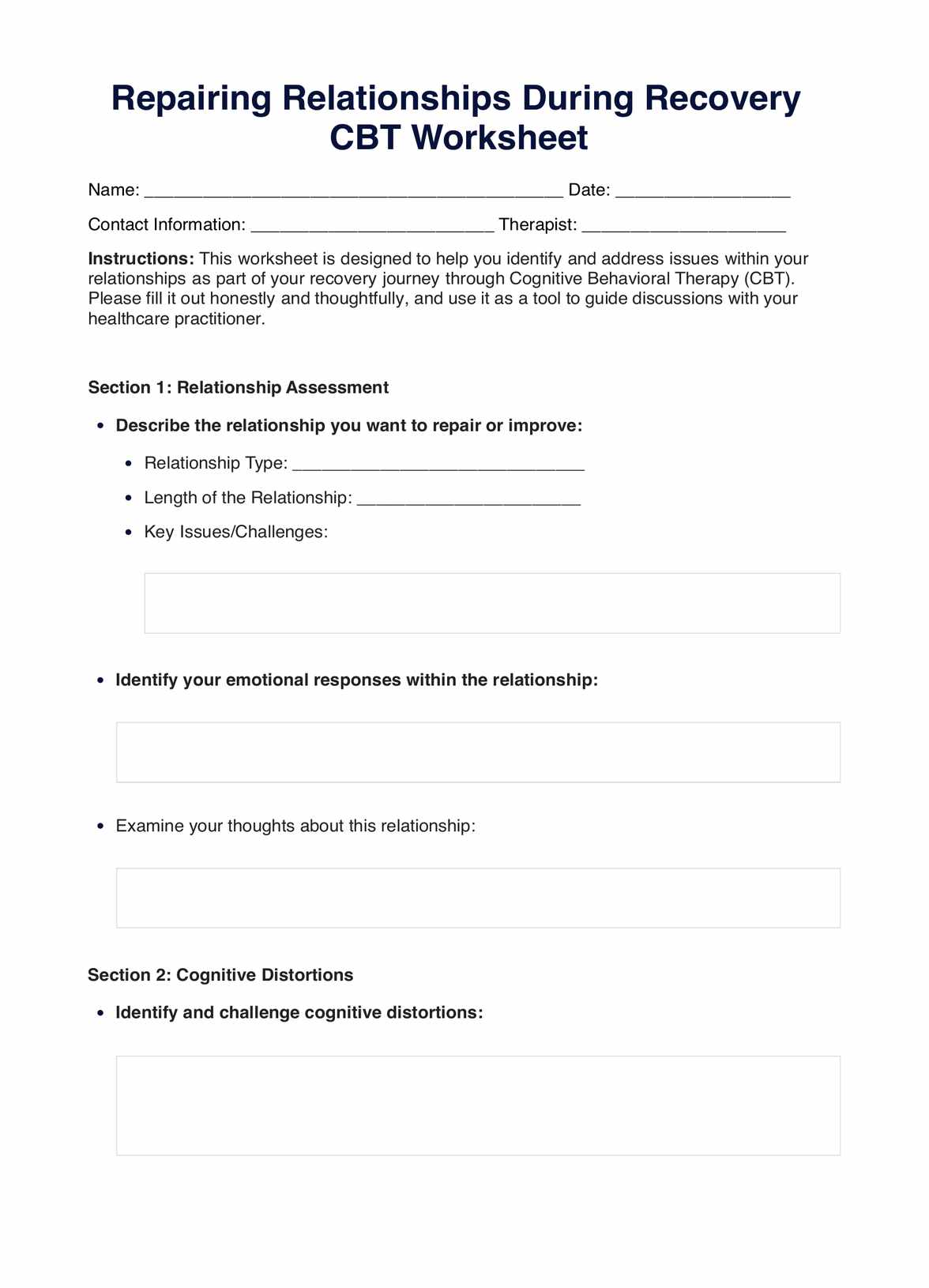
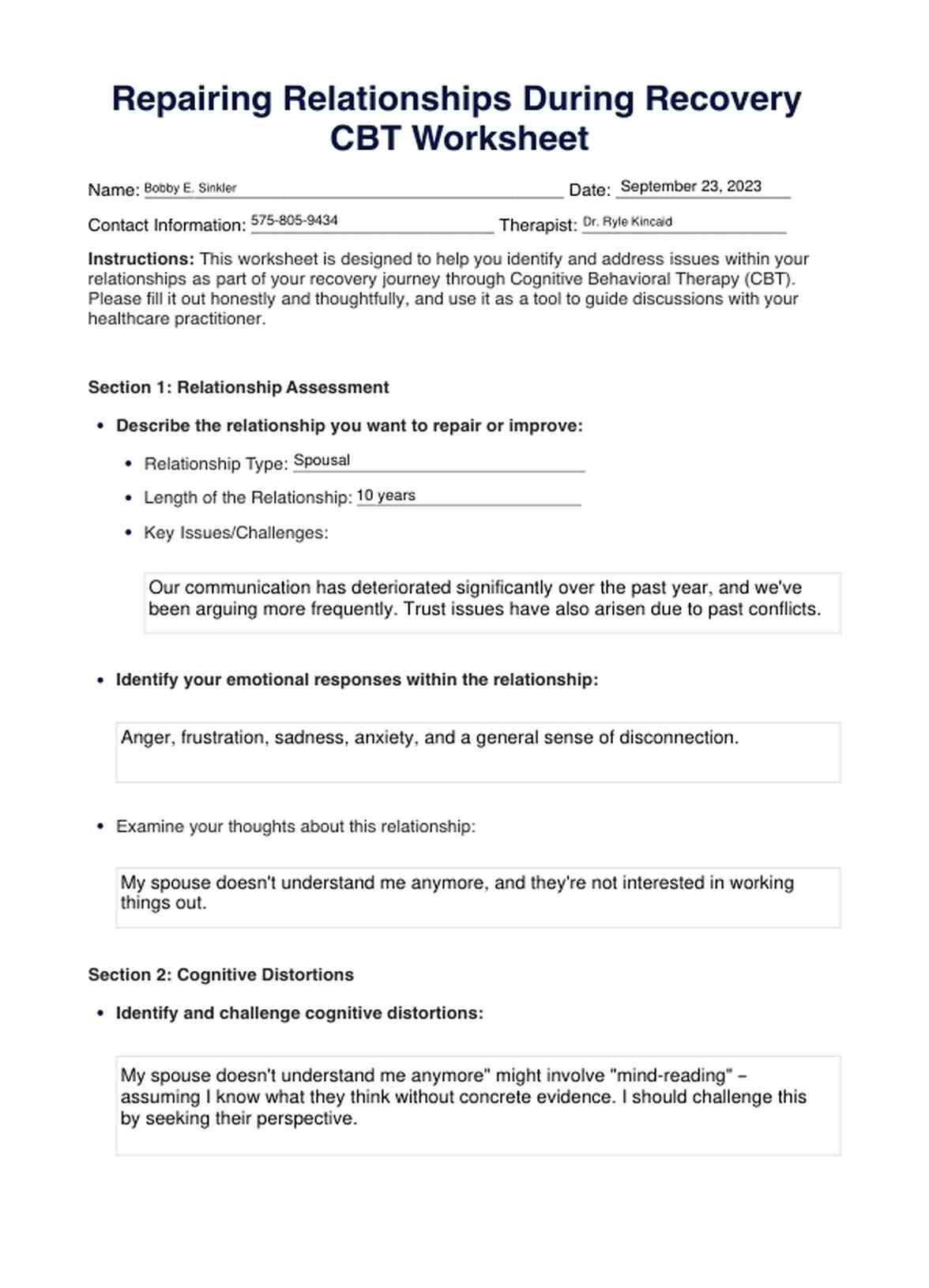















-template.jpg)


